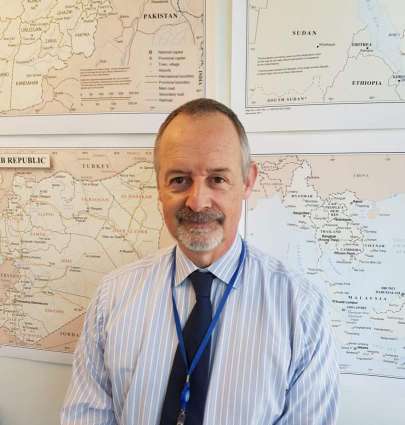The Turkish military operation in northern Syria has increased the number of Islamic State terrorists (IS, ISIL, outlawed in Russia) at large, some of whom may try to disappear among civilians, but the scale of the problem is still unclear, Coordinator of the UN Analytical Support and Sanctions Monitoring Team concerning ISIL, Al-Qaida (banned in Russia) and Taliban Edmund Fitton-Brown told Sputnik
GENOA (Pakistan Point News / Sputnik - 08th November, 2019) The Turkish military operation in northern Syria has increased the number of Islamic State terrorists (IS, ISIL, outlawed in Russia) at large, some of whom may try to disappear among civilians, but the scale of the problem is still unclear, Coordinator of the UN Analytical Support and Sanctions Monitoring Team concerning ISIL, Al-Qaida (banned in Russia) and Taliban Edmund Fitton-Brown told Sputnik.
In mid-October, the self-proclaimed Kurdish Autonomous Administration in Syria said that at least 785 IS-associated prisoners had escaped a prison camp Ain Issa in northeast Syria, where Turkey has been conducting a military operation against the Kurdish forces since October. On October 22, Russian Defense Minister Sergei Shoigu said there had been a period of more than two days, when a part of the prisons' guard was withdrawn, resulting in up to 500 inmates fleeing the detention facilities in the region.
"The Turks have shown self-discipline, there has been peaceful interaction between a range of member states who are involved in this, Russia included, and so I think the conclusion is that the unpredictable disruption has been kept to a minimum. But to answer your question, has that minimum been problematic? I think somewhat yes. We certainly believe that some people have escaped from facilities," Fitton-Brown said in an interview.
"It is not clear to us that this is a large number of particularly dangerous individuals. But we don't know enough yet to say that with any certainty. I think the numbers sound a little high. I have heard about 700 mentioned. I have also heard a thousand mentioned, but I'm not convinced that these numbers are not a little high ... So I think there are certainly more ISIL at large now than there were before the operation, but whether that's enough to make a significant difference to the nature of the threat I can't say," he continued.
The UN team coordinator noted that the prisons in northeastern Syria had always been of improvised nature and had never been based on jurisdiction. Therefore, there has never been a satisfactory state of affairs at these facilities, which causes concern of the international community.
"I think these people who have left the facilities, they will either consider themselves amongst the civilians or they would probably go into facilities provided for them by ISIL operatives and ISIL sympathizers. We know that ISIL were preparing to treat these people ... So there would have been some kind of reception available, probably not a very well formulated one and probably not much in the way of facilities," Fitton-Brown said.
"So I think that there will be a split between those two outcomes - some would be with facilitators and sympathizers of ISIL, and some will have disappeared into civilian population movements. Some may of course have sought to cross the border with some others into Iraq. We don't know the size of the problem. I don't think that we could say that the threat has been strategically increased, but we certainly need to monitor it," he continued.




